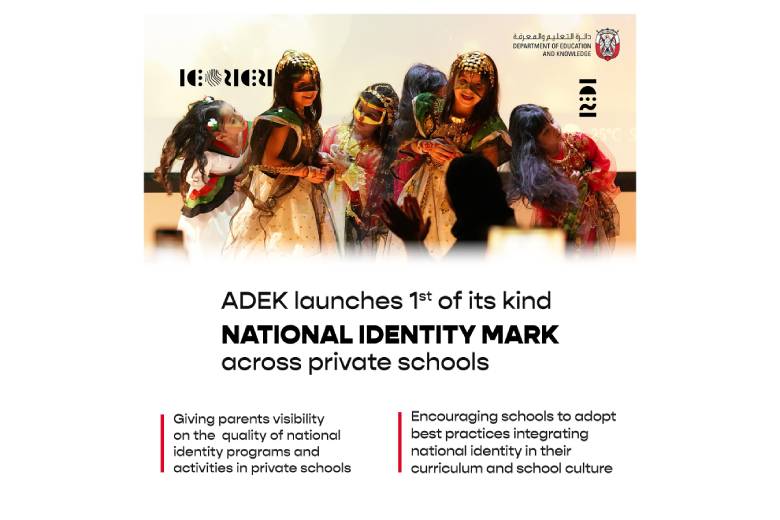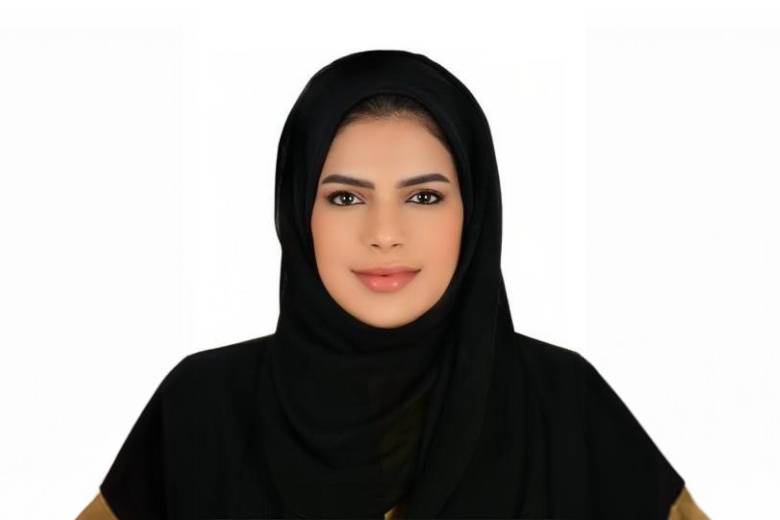Earlier this year, Abu Dhabi Department of Education and Knowledge (ADEK) introduced the UAE’s first National Identity Mark. In line with its ongoing commitment to boost school transparency and empower parents to select the ideal school environments for their children, the new annual school ratings system is designed to provide parents with full visibility on the quality of national identity programmes and related activities in private schools across the emirate. Education UAE spoke with Dr. Sara Al Suwaidi, Education Quality Assurance and Monitoring Officer Director for ADEK, about the process of implementing the National Identity Mark and how the new rating system will benefit students and parents.
EdUAE: Can you tell us a little about the National Identity Mark and how the concept was developed?
Dr. Sara Al Suwaidi: The National Identity Mark is the first-of-its-kind rating system that is designed to give parents full visibility on the quality of national identity programmes and activities in private schools across Abu Dhabi.
The aim of this rating system is to provide parents with the means to select the ideal school environment for their children while also serving as a testament to ADEK’s dedication to strengthen transparency in schools across the emirate.
We developed the National Identity Mark to enhance schools’ accountability for developing an educational landscape that exemplifies academic excellence and instills a strong sense of national pride among students by equipping them with the necessary tools to be able to navigate the diverse global landscape with robust understanding of their own cultural background.
The rating system was developed to encourage private schools to implement national identity within their curricula and schools’ culture, fostering a profound comprehension of the UAE’s traditions, customs, and values among Emirati students.
Schools are assessed based on the quality of their national identity programmes
EdUAE: Can you explain the evaluation framework?
Dr. SAS: The evaluation framework covers three primary domains including ‘Culture’, ‘Values’, and ‘Citizenship’, each comprising three unique dimensions, focusing on the values, vision, and legacy of the late Sheikh Zayed bin Sultan Al Nahyan.
The evaluation of the ‘Culture’ domain assesses Arabic language which is a unifying force among people across the region and a fundamental component in underpinning the UAE’s national identity. Following the ‘Arabic language’ evaluation, a comprehensive History evaluation is conducted to ensure students’ in-depth understanding of their country’s cultural legacy and profound appreciation of the UAE’s solid foundation, accelerating the country’s international growth. Heritage is the third element of the ‘Culture’ domain, putting to the test schools’ efforts in enriching students’ knowledge of the country’s cultural heritage, to establish a sense of belonging and continuity among them, and create a vital link between the nation’s past, present, and future. It ensures that our national identity thrives as a vibrant and evolving reflection of our Emirati people and their collective experiences.
The ‘Values’ domain focuses on elements of respect, compassion, and a global perspective. We have incorporated Respect in the evaluation process for the crucial role it plays in maintaining a positive and productive environment within the school community, as it contributes to creating harmony and a mutual understanding among students. Evaluating Compassion is in line with our efforts to support the UAE’s endeavors in promoting social cohesion through emphasising the well-being of community members and reinforcing core values that boost unity among the entire nation. Furthermore, the
Global Understanding element of the framework is designed to equip students with a clear understanding of the UAE’s impact on international relations and provide them with the necessary global skills to navigate the complexities of the modern world, while simultaneously staying grounded in their roots and culture.

Additionally, the domain of ‘Citizenship’ places emphasis on belonging, volunteering, and conservation. Driven by the unifying ethos of our founding father Sheikh Zayed, we believe in developing a robust sense of belonging among all members of our Abu Dhabi and the UAE community, which in turn contributes to productive society members that are inspired to engage in civic life and are proud of their national identity. Through the assessment of Volunteering as an integral component of the National Identity Mark, we will establish a nation that continues to promote a culture of altruism and active citizenship. Moreover, fostering a volunteering spirit among the country’s people will motivate them to devote their time, energy, and resources to take part in activities that benefit the entire community. As for the Conservation element, it is heavily connected to Sheikh Zayed’s vision in preserving and protecting the UAE’s natural, cultural, and historical resources. Its assessment emphasises instilling a sense of stewardship in citizens, contributing to a more sustainable and knowledge-based economy for the country.
We believe in developing a robust sense of belonging among all members of our Abu Dhabi and the UAE community
EdUAE: What will schools need to do to achieve in each domain?
Dr. SAS: Private schools in Abu Dhabi hold a social responsibility to promote national identity and culture among its students- both Emiratis and expats- to empower them to understand and embrace our values and graduate as active citizens.
While we prioritised schools with the highest number of Emirati students in the first phase of our evaluations, schools without national enrolment are encouraged to request an evaluation if they have relevant programmes and activities that immerse expatriate students in the rich heritage of the country.
The 87 schools that have already been evaluated will be revisited during the academic year 2023/24 to ensure their continued adherence to the framework and evaluate ongoing efforts to improve tailored national identity programmes and activities. The next cycle of visits will also cover additional private schools with Emirati population among its students.
EdUAE: What is the rating system?
Dr. SAS: Schools are assessed based on the quality of their national identity programmes with rankings comprising of the following categories: ‘Outstanding’, ‘Good’, ‘Acceptable’, or ‘Weak’. Phase 1 ratings have been released for the current academic year 2022/23 covering a total of 87 private schools in Abu Dhabi.
Eight schools demonstrated excellent national identity integration across their curriculum, school provisions, and impact on students, earning a well-deserved ‘Outstanding’ evaluation for their remarkable performance. These schools include The British International School; Sheikh Zayed Academy for Girls; Sheikh Zayed Academy for Boys; Emirates National Schools, MBZ City; Al Ittihad National Private School, Khalifa City; Al Ittihad National Private School, Shakhbout City; Emirates National Schools, Branch 3; and ADNOC Schools, Sas Al Nakhl. Furthermore, 21 schools received a ‘Good’ rating, while 35 received ‘Acceptable’, and 23 received ‘Weak’ evaluations.
EdUAE: How were inspections carried out in phase 1 of the evaluation?
Dr. SAS: With educational equity, transparency, and accountability forming a key precedence within the system’s evaluation process, both curricula and school culture were thoroughly evaluated in phase 1 across all Abu Dhabi private schools with UAE nationals enrolled. A group of Emirati inspectors were assembled to assess 87 private schools with the highest number of Emirati students.
The evaluation process centered on various aspects including the alignment of the school’s national identity narrative, lesson observations, review of key documents, and most importantly, interactions with teachers, students, and staff to evaluate impact across the school.
EdUAE: What benefits do you hope to see for the students?
Dr. SAS: At ADEK, we are focused on building a future generation that is proud of their national identity and their Emirati roots, traditions, and values. We recognise the powerful impact of fostering a sense of belonging on efficiently preparing national students to represent the UAE on a global scale.
As for expatriates, the National Identity Mark serves as a catalyst for fostering greater understanding of the country’s culture, traditions, and values, cultivating a stronger sense of appreciation of the country’s heritage as well as nurture cohesiveness and inclusivity among the entire community.

Even schools with limited Emirati enrollment have achieved good rankings in the evaluation
EdUAE: Now that the results have been released for the National Identity Mark, is there anything that particularly stands out to you?
Dr. SAS: The results of the first phase showcased schools’ great willingness and efforts in reflecting their understanding of the local culture. Remarkably, even schools with limited Emirati enrollment have achieved good rankings in the evaluation, which reiterates the effectiveness of incorporating the national identity mark’s elements into the schools’ curriculum and culture. It has enabled Emirati students to foster a profound connection with their traditions, thereby nurturing a more robust sense of national identity.
As the National Identity Mark rankings were assessed separately from ADEK’s Irtiqaa Inspection, it was interesting to see how some schools with high ratings in Irtiqaa inspections do not necessarily rate the same in national identity evaluations. The results will empower parents to make well-informed decisions when selecting schools for their children as it offers valuable Insights into the quality of national identity programmes and activities across the emirate’s private schools.
EdUAE: Have the results highlighted any areas for schools to focus on in the coming year?
Dr. SAS: School reports highlighted some areas of improvement for schools, with history, global understanding and volunteering being the most common areas that require improvement among the concerned schools. The reports highlighted the main areas that schools could channel their attention towards to enhance their performance for upcoming evaluations in the next academic year.
















